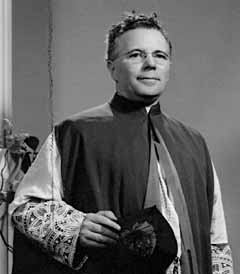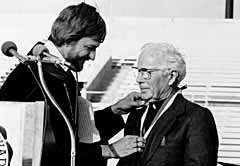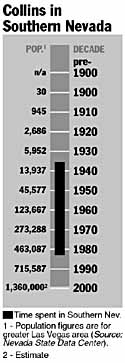Monsignor Thomas Collins



Scan the pages of old issues of the Las Vegas Age and the Las Vegas Evening Review, and you may come across the word “floater,” as in “the sheriff gave him a floater out of town.” It meant that the person was obliged to remove himself forthwith, by whatever means possible, from the town. It was a popular and cost-effective means of dispensing with moonshiners, bootleggers, opium den operators, card cheats, suspected thieves and most of all, vagrants or “vags,” as the newspapers called them.
Which is not to say that early Las Vegas was a town without pity for the less fortunate. Individual acts of charity were common, churches helped when they could, and the town was famously generous when a worthy citizen fell upon hard times.
But Las Vegas, with its expectations of one day becoming a great Western city, was also image-conscious. And the sight of several hundred hoboes clustered in the brush west of the railroad yards was not consistent with that up-and-coming image.
In 1930, yet another young, not-so-wealthy young man was wandering through America, seeking his place in a new country, and had stopped to have a look at Houston. He stayed only a short while, presumably to raise some traveling funds, before making his way to San Francisco. His name was Thomas F. Collins, and he was a native of Tralee, County Kerry, Ireland, one of 12 children of John and Nora Barrett Collins. The family owned a small farm where they labored mightily for whatever food the poor soil would render. Young Tom graduated from the public schools of Tralee, and received his secondary education in Wexford.
In 1932, Collins was called to the priesthood, and entered St. Patrick’s Seminary in Menlo Park, Calif.
A year earlier, in 1931, Pope Pius XI had detached all of Nevada from the administration of the Dioceses of Sacramento and Salt Lake, and created the Diocese of Reno, encompassing all of Nevada. This had happened by chance when Chicago’s Cardinal Mundelein was traveling by train to San Francisco. Awed by the vast spaces outside his window, the Cardinal asked where he was. When informed that the train was in Nevada, he asked who served as Bishop of this huge area, and was amazed to learn that of all forty-eight states, Nevada was the only one with no Bishop and no diocese of its own.
Thomas K. Gorman was named the first Bishop of the new diocese, and when Collins graduated from seminary, he became, in May 1936, the first priest ordained in the Diocese of Reno.
His first assignment was as secretary to Gorman and vice-chancellor of the Diocese. The bishop soon realized that diminutive priest with the lilting brogue was an extraordinarily competent and hard-working administrator.
“Bishop Gorman needed an energetic man to get a Catholic Welfare agency organized, and he found him in Thomas Collins,” says the Rev. Caesar Caviglia, formerly pastor of St. Peter’s Catholic Church in Henderson, and now retired.
Collins was sent to the Catholic University of America in New York, where he graduated in 1940 with a master’s degree cum laude in social sciences.
“My study of sociology led me into a different kind of world altogether,” he recalled in a 1977 interview, “and that’s the world of being concerned and being compassionate and caring about those less fortunate than ourselves.”
He was immediately named diocesan director of Catholic Welfare and, in 1940, established the Catholic Welfare Program, opening offices in Las Vegas and Reno. Soup kitchens were the first step, and the program also offered shelter for homeless families on an emergency basis.
During the war years, Collins served as auxiliary chaplain at the now closed Stead Air Force Base in Reno, and turned most of his attention to the needs of the thousands of military men who poured into Nevada. He opened three USO Clubs in Las Vegas; one on Stewart Street for servicemen, another in West Las Vegas for black workers employed at Basic Magnesium in Henderson and a third on Second Street for the families of servicemen. He later built another USO Club in Boulder City, two in Reno and one in Hawthorne. Because of his work for the USO, he was named a national director of the USO and was honored with a special citation from the War Department.
“He moved around in secular circles very easily,” Caviglia recalls. “He identified with Nevada, the regular people, the poor people and the political people.”
One of the latter, Gov. E.P. Carville, appointed Collins to the State Welfare Board in 1943, and he served until 1949. He was an outspoken advocate for improving the living conditions of children who had become wards of the state, and for tightening up Nevada’s lax adoption laws. He also was instrumental in establishing the first Nevada laws providing aid to dependent children. As an adviser to the Nevada State Mental Hospital, he pushed for, and got recreational and occupational therapy programs instituted.
“He was the leader in the state of Nevada in all social welfare areas, and especially in establishing the State Children’s Home in Carson City,” says the Rev. John McVeigh, pastor emeritus of St. Anne’s Catholic Church.
Collins was not hesitant about importing specialized talent when he was faced with a difficult task. While trying to work out the logistics of redesigning the Nevada orphanage, he consulted with Father Edward Flanagan, the legendary priest who founded Boy’s Town in 1917.
“When you go into a specialized field,” he explained, “you should get the best advice from those who are successful in that field.”
And Flannigan gave Collins some advice that he often repeated throughout his career.
“Always remember you have a product to sell,” said Flannigan, “and always remember we have the best product to sell — Christian charity to our fellow man.”
Word of Collins’ accomplishments eventually reached the top of the church heirarchy and, in 1947, Collins was elevated by Pope Pius XII to the rank of domestic prelate with the title of Monsignor. For a priest of 41, this was an unheard-of honor, usually reserved for much older priests with many more years of service.
Shortly after, he was named pastor of the Little Flower Church, then pastor of St. Thomas Aquinas Cathedral, both in Reno.
In 1953, Collins was named pastor of St. Joan of Arc Church, and Dean of Southern Nevada, representing the Bishop here. His tenure lasted only two years, but in that time, he remodeled the city’s first Catholic Church, installing carpeting and Italian statuary. He then returned to the Little Flower Church in Reno to establish a Catholic School there.
By 1962, the school established, he returned to St. Joan of Arc Parish. Here he would spend the rest of his career, at least those parts of it not spent in Ireland.
Father John McVeigh, who was required to tend the monsignor’s flock while he was away, recalls that sometimes it was hard to get him back to work.
“We would travel to Ireland ostensibly for a three-weekend visit,” says McVeigh. Shortly before he was due back, McVeigh would pick up the phone and hear the monsignor’s familiar brogue.
“Now, Johnny,” he would say, “would you give me just another weekend?”
Cavigilia remembers Collins as the man to whom recently arrived and culture-shocked Irish priests would turn for advice.
“He was familiar with American culture and very sharp in business dealings,” says Caviglia, who notes that Collins also was a savvy real estate speculator, acquiring many choice sites for new parishes at bargain prices. He also used his business acumen to devise a sort of retirement plan for his fellow priests. In those days, Caviglia explains, there was no church pension plan for priests. Collins would acquaint them with the workings of the booming Las Vegas real estate market, and they would purchase a piece of land to be sold off later for their retirement money. (One priest, the Rev. Gerald Fanning, picked up a lot at the corner of Paradise and Flamingo Roads, now the site of the Continental Hotel.)
On Sept. 28, 1962, President John F. Kennedy took a tour of the Nevada Test Site and made a speech to a packed Las Vegas Convention Center. At the conclusion of the speech, Monsignor Collins blessed the assembly and the nation’s first Roman Catholic president. Less than two months later, Kennedy would be shot dead in Dallas.
In 1976, Collins received the UNLV Distinguished Nevadan Award, which is awarded to those who have made a “significant contribution to the advancement of our state and nation, and for exceptional service to the well-being of mankind.”
At the end of June 1977, after 14 years in Las Vegas and 41 years in the priesthood, Collins retired, and reflected upon his career and upon American society.
“It’s frightening the type of society we have developed. We cannot change society at all for the better through money or by hiring extra police … We must start with the children … If we don’t get love, we grow up frustrated, because you can never give to others what you don’t have.
“If you want to change society, you have to go to the source of the troubles … but nobody wants to do that because you step on too many people’s toes.
“We have lost the consciousness of sin. Today, anything you do is not wrong. As long as you get away or are not caught, it’s all right. We’ve lost our sense of guilt and that’s the frightening thing.”
In 1982, Collins returned to his native Ireland, and died there the following year. But his presence is still felt here. In his own words, “The Irish missionaries are like the presence of Christ they are everywhere.”
Part I: The Early Years
Part II: Resort Rising
Part III: A City In Full












